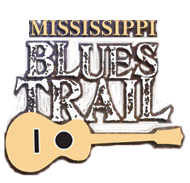Beale Town Bound
Beale Town Bound - Hernando
The Hernando area was the birthplace of an important group of musicians who helped establish Memphis as a major blues center in the 1920s. These include Jim Jackson, Robert Wilkins, and Dan Sane, who was the partner of Beale Street blues pioneer Frank Stokes. Jug band leader Gus Cannon, who is buried nearby, also performed here before settling in Memphis. Other local natives include George “Mojo” Buford, who played harmonica with the Muddy Waters band, and guitarist Earl Bell.
Jim Jackson was born in Hernando in 1878, placing him among the earliest-born artists to record blues, and worked for many years with traveling medicine shows including the Rabbit Foot Minstrels and Silas Green From New Orleans. His repertoire from these shows was reflected in many of the songs he recorded between 1927 and 1930, such as his colorfully titled “I Heard the Voice of a Porkchop.” His most famous song, “Jim Jackson’s Kansas City Blues,” was widely covered by other artists. Jackson died in Memphis in 1933.
Gus Cannon was born in nearby Red Banks in 1883 or 1884 and was buried in 1979 in the Greenview Memorial Gardens cemetery in north Hernando. As a teenager in the Clarksdale area he was influenced by pioneering slide guitarist Alec Lee and soon began playing the banjo with a slide. Cannon worked regularly as a musician on medicine shows, frequently together with Jim Jackson. He recorded in 1927 as “Banjo Joe” and between 1928 and 1930 made many jug band recordings as leader of Cannon’s Jug Stompers. After many years of relative inactivity as a musician Cannon returned to performing in the early ‘60s after his song “Walk Right In” became a pop hit for the folk group the Rooftop Singers.
In her biography of her grandfather, educator and blues musician Mary Elaine “Lane” Wilkins wrote that Robert “Tim” Wilkins (1896-1987) first met Jim Jackson and Gus Cannon in 1912 while they were performing together at Mary Cotton’s Place here in the West End of Hernando. Wilkins subsequently moved to Memphis and between 1928 and 1935 recorded eight singles including “Rolling Stone.” In the late 1930s Wilkins became a minister in the Church of God in Christ, and in the 1960s he began performing his blues-inflected gospel music on the blues revival circuit. He remade his blues recording “That’s No Way To Get Along” into the gospel song “Prodigal Son,” which was subsequently covered by the Rolling Stones on their Beggars Banquet album. His son John Wilkins likewise performed and recorded gospel in a similar bluesy style.
Guitarist Dan Sane (also spelled Sain, Saine, or Sains) was born near Hernando in 1892 or 1896. He joined forces with guitarist and vocalist Frank Stokes in Memphis in the early ‘20s for a partnership that lasted several decades. Stokes and Sane, who were noted for the intricacy of their guitar interplay, recorded over twenty duets as the “Beale Street Sheiks” between 1927 and 1929. Sane, who died in 1965 in Osceola, Arkansas, was the grandfather of the blues/R&B producer and performer Oliver Sain.
Captions
Before the Great Depression hit, the Chicago Defender, the country’s leading African American newspaper, published many ads for blues records between 1920 and 1930, including ones for Jim Jackson (Mar. 17, 1928) and Robert Wilkins (Jan. 4, 1930).
Another Hernando native, Earl Bell (1914-1977), traveled widely as a musician prior to settling in Memphis in the 1950s. He claimed to have played with Robert Johnson in the 1930s.
Harmonica player George “Mojo” Buford was born near Hernando in 1929. He moved to Memphis and then to Chicago, where he performed as “Muddy Waters, Jr.” In the 1960s he began working and recording on and off with the Muddy Waters band.
content © Mississippi Blues Commission
[ BACK TO TOP ]

